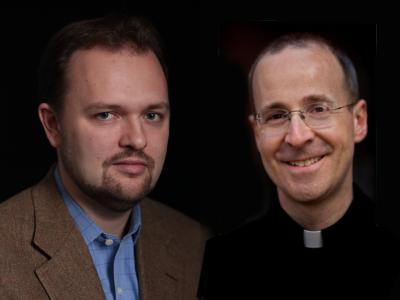
Ross Douthat and James Martin, SJ
(Photo: America magazine)
Here’s a really good exchange between the conservative Catholic Ross Douthat and the progressive Catholic priest James Martin, SJ. The topics? Liberals, conservatives, the pope, the family, and the future of Catholicism. I can’t possibly do justice to the richness of this discussion with these quotes. But here is a taste. First, Douthat:
I doubt I’ll convince you here, but maybe a couple of questions would help us avoid staleness in debate. First, I wonder if you would put yourself in shoes of those of us unsettled by this year’s events. What, if anything, belongs in Category 1 for you? What form of fidelity to Jesus do you consider so absolutely essential that if it were called into question you would see a crisis looming for the church to which you’ve vowed your life?Does it make you feel uncomfortable at all that every power and principality of our age—every establishment, political and judicial and cultural—is on the side of change in these internal church debates?And second, to end where you end, discerning the Holy Spirit’s movement: It seems to me that there have been many cases in church history when the faith did need to learn from a changing culture, to read the signs of the times and to adapt. But there are just as many cases, under regimes ancien and modern, when “adaptation” meant corruption, worldliness, the partial abandonment of the gospel. And I always wonder, in our contemporary discussions about sex and marriage, how would-be reformers so confidently distinguish the Spirit from the spirit of the age. By which I suppose I mean: Does it make you feel uncomfortable at all that every power and principality of our age—every establishment, political and judicial and cultural—is on the side of change in these internal church debates? Does it ever make you worry, even a little, that these reforms are truer to a passing historical moment than to Christ?
Now, Fr. Martin:
I do sometimes worry that we are moving too fast and acceding merely to cultural norms. That is something I think about quite a bit these days. But that is where discernment comes in—something that we Jesuits and our Jesuit brother, Pope Francis, are fond of discussing. The discerning person, or bishop, or church, can prayerfully reflect on why these questions are coming up now, what we are called to do, what our motivations are, and what the Holy Spirit is asking of us. So I trust in the Spirit.But by way of wrapping things up for a final interchange, let me pose a question to you.First, do you worry that we might be so enamored of tradition (not Tradition but simply tradition) that we may miss what the Holy Spirit is asking of us, and unable to read the “signs of the times,” as Christ asks? More to the point, do you worry that our church could unintentionally repeat what Jesus accused some of the Pharisees of doing, that is, laying down “heavy burdens” on people, seemingly more concerned with laws than human beings?Let me be clear: I’m not calling either you, or anyone who agrees with you, or anyone else for that matter, a “Pharisee.” But Jesus invites us to ask ourselves if we are behaving in that manner. Thus, the church—that is, we, the entire People of God—must always be alert to the danger of relying on the law so much that we miss Christ’s call for mercy. Again, it is always balance: law and mercy. But in my mind Jesus tips the scales consistently to mercy, as when he levels his own judgment on the Pharisees, “They tie up heavy burdens, hard to bear, and lay them on the shoulders of others; but they themselves are unwilling to lift a finger to move them.”As I say, it’s a balance, but ceteris paribus, stinginess with mercy seems like something that we would have to answer for when we finally meet Jesus Christ.
Read the whole thing. If all our discussions across theological and ideological lines that were so rich, deep and civil, how much better off we would all be. Thanks to both men for their efforts.
UPDATE: One more quick clip from the dialogue. Here is Douthat:
Since I think there’s a sense sometimes that conservative Catholics inhabit a kind of sociological bubble, in which we don’t see the burdens the church imposes clearly, I’ll end this dialogue on a personal note. I’m a child and grandchild of divorce, whose immediate family manifests not only different ways of being Catholic, but just about every possible variation on contemporary lifestyle and belief. Based on that experience, I can promise you that there is pain and suffering in every dispensation, which no pastoral gesture can undo—and that as many burdens can be laid on people by a world that cares little for any moral standard as by a church that cares too much for rigor.All teachings, all ideas, blur a little upon contact with lived experience, and in that sense I completely (indeed, very personally) understand where the “pastoral” camp is coming from in these controversies. I do not pretend to know the perfect answer to every situation or dilemma, and I wouldn’t want to inhabit a church of ruthlessly policed communion lines, or a church where parishes in San Francisco or New York were all run on exactly the same lines as parishes in rural Michigan.But I know very well (and again, very personally) what kind of answers the world gives, and what answers most Americans assume they’re basically entitled to receive. And I think the danger of a pharisaical church, while always present, is remote today compared to the clear and pressing danger of a church that no longer even tries to teach the truth.
This. A thousand times this.
Posted in Christianity. Tagged Catholic, Catholicism, doctrine, Family, James Martin SJ, justice,mercy, Pope Francis, Ross Douthat.
No comments:
Post a Comment